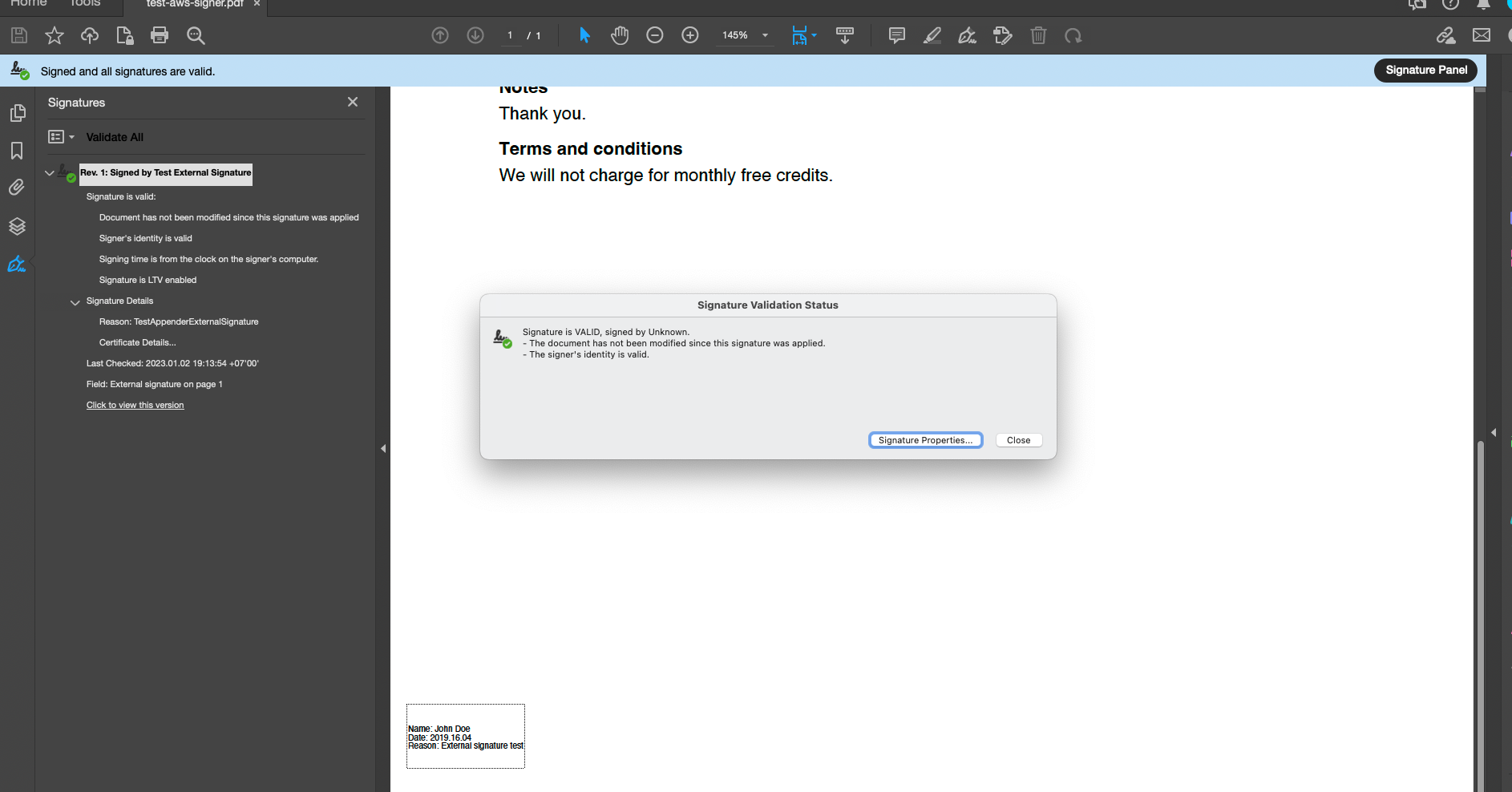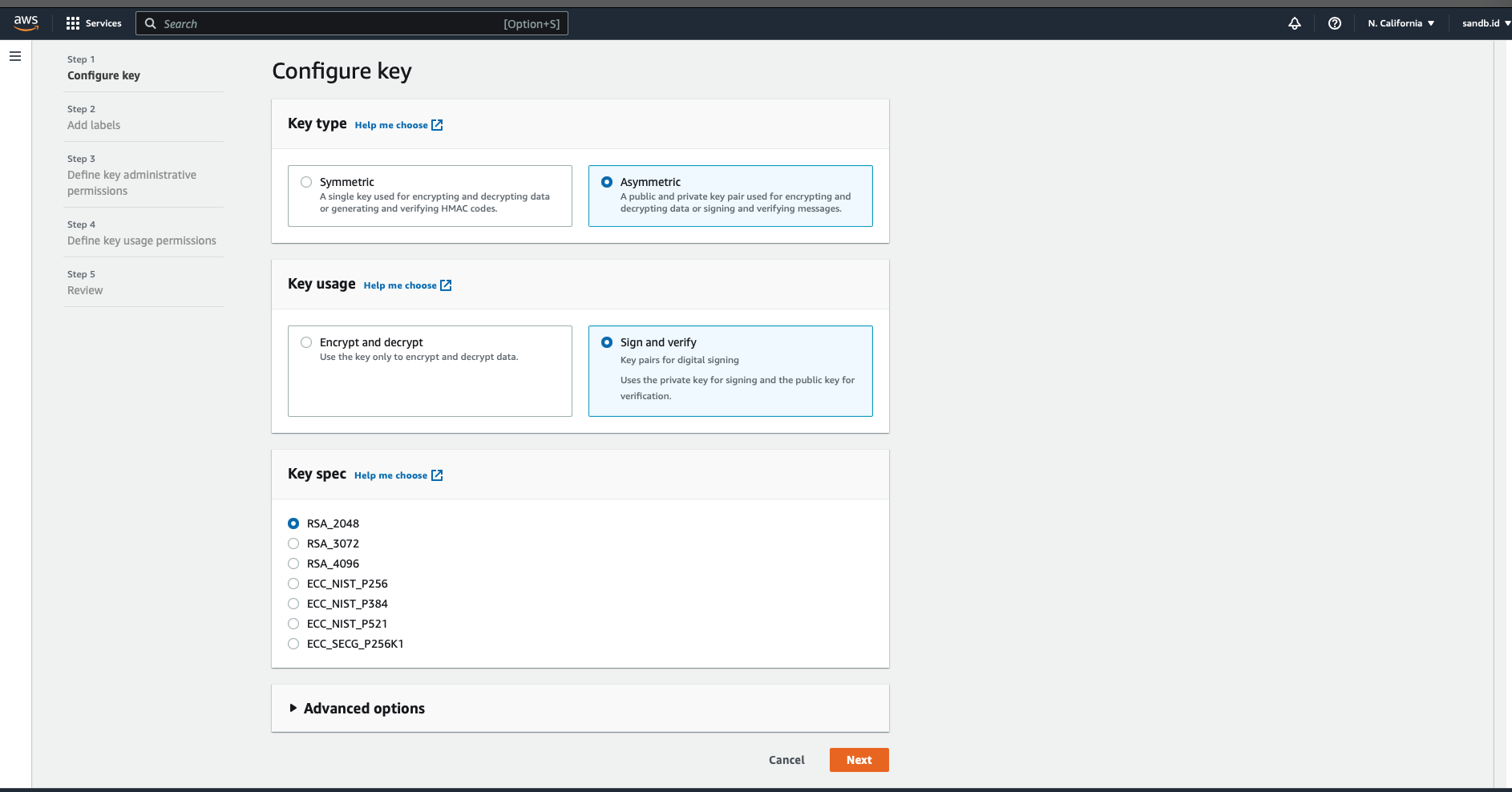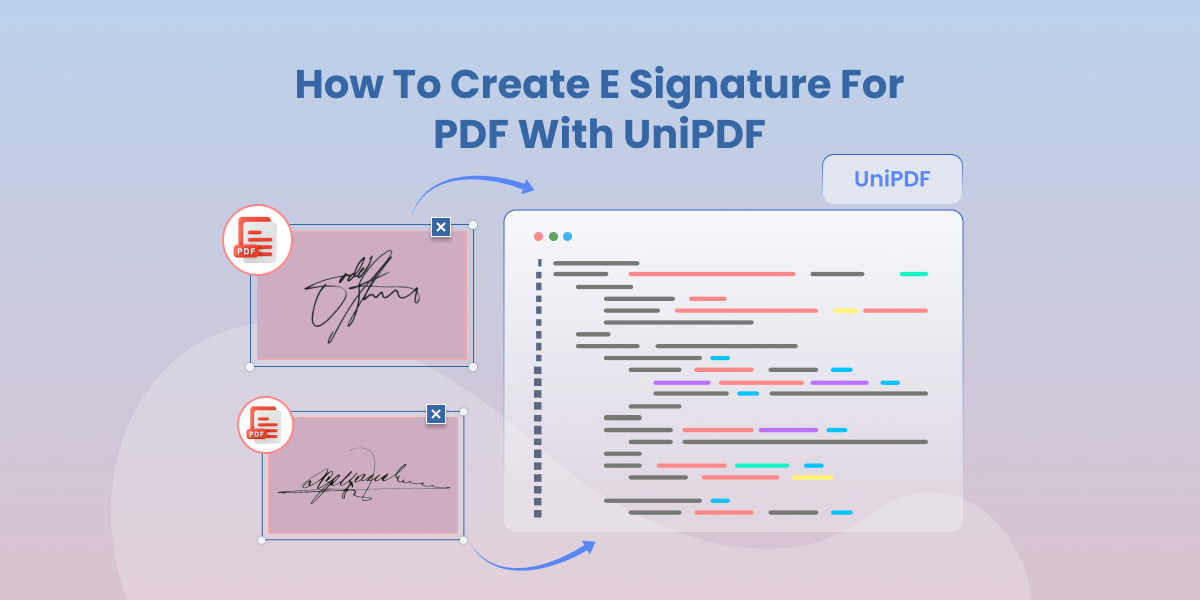Sign PDF with UniPDF and AWS KMS

Introduction
This example show how to sign PDF with AWS KMS using UniPDF.
AWS KMS services will do sign for PDF digest message instead we sign it locally.
As stated by AWS KMS about Asymmetric Key:
An asymmetric KMS key represents a public and private key pair that can be used for encryption or signing. The private key remains within AWS KMS.
We need to make modification at the process of signing at UniPDF in order to work with AWS KMS Asymmetric Key.
Requirements
- AWS KMS Asymmetric Key with Key Usage Sign and Verify.
- UniPDF library.
The Process
Generate AWS KMS Asymmetric Key, with this we will get the public key associated with the key.
Go to AWS KMS Console, then we need go to menu Customer-managed keys from that create the Key.
After you create the key, you will get the KEY_ID, with that Generate self-signed certificate using public key returned from AWS KMS Asymmetric Key or you can download the public key, save it and load it from file.
For production you will need services to generate CA by creating CSR using your AWS KMS Public Key, information regarding What is AWS Private CA? AWS Private Certificate Authority.
This part of code show how to create customized crypto.Signer and use it with X509 to create the self-signed certificate.
// This are part of customized `crypto.Signer`.
// SignerCallback callback function of `crypto.Signer`
type SignerCallback func(rand io.Reader, digest []byte, opts crypto.SignerOpts) ([]byte, error)
// CryptoSigner Customize crypto signer wrapper to implement `crypto.Signer`.
type CryptoSigner struct {
keyId string
client \*kms.KMS
callback SignerCallback
}
// EncryptionAlgorithmOID returns encryption OID algorithm supported by external services.
func (cs \*CryptoSigner) EncryptionAlgorithmOID() asn1.ObjectIdentifier {
return pkcs7.OIDEncryptionAlgorithmRSASHA256
}
// Public returns signer public key by calling to client services.
func (cs \*CryptoSigner) Public() crypto.PublicKey {
if cs.client == nil {
return nil
}
publicKeyResp, err := cs.client.GetPublicKey(&kms.GetPublicKeyInput{
KeyId: aws.String(cs.keyId),
})
if err != nil {
return nil
}
spki, err := x509.ParsePKIXPublicKey(publicKeyResp.PublicKey)
if err != nil {
return nil
}
return spki
}
// Sign with customized `crypto.Signer`.
func (cs \*CryptoSigner) Sign(rand io.Reader, digest []byte, opts crypto.SignerOpts) (signature []byte, err error) {
if cs.callback != nil {
return cs.callback(rand, digest, opts)
}
// Encrypt the data.
result, err := cs.client.Sign(&kms.SignInput{
KeyId: aws.String(cs.keyId),
Message: digest,
// Set AWS `MessageType` to digest as we send the digest instead raw message.
MessageType: aws.String("DIGEST"),
// SigningAlgorithm must be match with digest algorithm.
// Use:
// - `crypto.SHA256` for `RSASSA_PKCS1_V1_5_SHA_256` and `RSASSA_PSS_SHA_256`
// - `crypto.SHA384` for `RSASSA_PKCS1_V1_5_SHA_384` and `RSASSA_PSS_SHA_384`
// - `crypto.SHA512` for `RSASSA_PKCS1_V1_5_SHA_512` and `RSASSA_PSS_SHA_512`
SigningAlgorithm: aws.String("RSASSA_PKCS1_V1_5_SHA_256"),
})
if err != nil {
return nil, err
}
return result.Signature, nil
}
func NewCryptoSigner(c \*kms.KMS, keyId string, cb SignerCallback) crypto.Signer {
return &CryptoSigner{
keyId: keyId,
client: c,
callback: cb,
}
}
// externalSigner is wrapper for third-party signer,
// needs to implement function of model.SignatureHandler.
// in this example, we use AWS KMS as third-party signer.
type externalSigner struct {
certChain []*x509.Certificate
// keyId AWS KMS ASYMMETRIC KEY_ID.
keyId string
// client is third-party api client.
// We make client as interface for supporting another third-party signer.
client \*kms.KMS
// signer customized `crypto.Signer`
signer crypto.Signer
ctx context.Context
}
// AwsKmsExternalSigner wrap externalSigner to model.SignatureHandler.
// With this, you can implement any third-party client signer into signature handler.
func AwsKmsExternalSigner(keyId string) (\*externalSigner, error) {
ctx := context.Background()
// Initiate AWS session.
sess, err := session.NewSession(&aws.Config{
CredentialsChainVerboseErrors: aws.Bool(true),
Region: aws.String("us-west-1"),
})
if err != nil {
return nil, err
}
svc := kms.New(sess)
// Generate external `crypto.Singer`.
extSigner := NewCryptoSigner(svc, keyId, nil)
return &externalSigner{
keyId: keyId,
client: svc,
ctx: ctx,
signer: extSigner,
}, nil
}
...
// This part show how to generate self signed certificate using `Crypto.Signer`.
// getExternalSignatureAndSign simulates an external service which signs the specified
// PDF file and returns its pdf signed bytes and signature.
func getExternalSignatureAndSign(inputPath string, keyId string) ([]byte, []byte, error) {
awsKmsSign, err := AwsKmsExternalSigner(keyId)
if err != nil {
return nil, nil, err
}
now := time.Now()
// Initialize X509 certificate template.
template := x509.Certificate{
SerialNumber: new(big.Int),
Subject: pkix.Name{
CommonName: "UniDOC",
Organization: []string{"Test Company"},
},
NotBefore: now.Add(-time.Hour),
NotAfter: now.Add(time.Hour _ 24 _ 365),
PublicKeyAlgorithm: x509.RSA,
SignatureAlgorithm: x509.SHA256WithRSA,
KeyUsage: x509.KeyUsageDigitalSignature,
}
// We sign certificate using external signer that implement `crypto.Signer`.
certData, err := x509.CreateCertificate(rand.Reader, &template, &template, awsKmsSign.getPublicKey(), awsKmsSign.signer)
if err != nil {
panic(err)
}
cert, err := x509.ParseCertificate(certData)
if err != nil {
panic(err)
}
certChain := []*x509.Certificate{cert}
awsKmsSign.certChain = certChain
// Sign input file.
handler := awsKmsSign.toSigHandler()
pdfBytes, signature, err := generateSignedFile(inputPath, handler)
if err != nil {
return nil, nil, err
}
return signature.Contents.Bytes(), pdfBytes, nil
}
Initialize the UniPDF customized signature handler with the certificate and use AWS KMS Sign to sign the digest message.
This part of code how to create the customized model.SignatureHandler.
// externalSigner is wrapper for third-party signer,
// needs to implement function of model.SignatureHandler.
// in this example, we use AWS KMS as third-party signer.
type externalSigner struct {
certChain []*x509.Certificate
// keyId AWS KMS ASYMMETRIC KEY_ID.
keyId string
// client is third-party api client.
// We make client as interface for supporting another third-party signer.
client \*kms.KMS
// signer customized `crypto.Signer`
signer crypto.Signer
ctx context.Context
}
// AwsKmsExternalSigner wrap externalSigner to model.SignatureHandler.
// With this, you can implement any third-party client signer into signature handler.
func AwsKmsExternalSigner(keyId string) (\*externalSigner, error) {
ctx := context.Background()
// Initiate AWS session.
sess, err := session.NewSession(&aws.Config{
CredentialsChainVerboseErrors: aws.Bool(true),
Region: aws.String("us-west-1"),
})
if err != nil {
return nil, err
}
svc := kms.New(sess)
// Generate external `crypto.Singer`.
extSigner := NewCryptoSigner(svc, keyId, nil)
return &externalSigner{
keyId: keyId,
client: svc,
ctx: ctx,
signer: extSigner,
}, nil
}
// InitSignature sets the `model.PdfSignature` parameters.
func (es *externalSigner) InitSignature(sig *model.PdfSignature) error {
// Create PDF array object which will contain the certificate chain data.
pdfCerts := core.MakeArray()
for _, cert := range es.certChain {
pdfCerts.Append(core.MakeString(string(cert.Raw)))
}
// Append cert to signature.
sig.Cert = pdfCerts
handler := \*es
sig.Handler = &handler
sig.Filter = core.MakeName("Adobe.PPKLite")
sig.SubFilter = core.MakeName("adbe.pkcs7.detached")
sig.Reference = nil
digest, err := handler.NewDigest(sig)
if err != nil {
return err
}
return es.Sign(sig, digest)
}
// Sign return error on failed sign.
func (es *externalSigner) Sign(sig *model.PdfSignature, digest model.Hasher) error {
if digest == nil {
sig.Contents = core.MakeHexString(string(make([]byte, sigLen)))
return nil
}
buffer := digest.(\*bytes.Buffer)
signedData, err := pkcs7.NewSignedData(buffer.Bytes())
if err != nil {
return err
}
// Set digest algorithm which supported by AWS KMS.
signedData.SetDigestAlgorithm(pkcs7.OIDDigestAlgorithmSHA256)
// Use customized callback if you want use different signature algorithm.
/_ cb := func(rand io.Reader, digest []byte, opts crypto.SignerOpts) ([]byte, error) {
_ Sign digest.
_ signResult, err := es.client.Sign(&kms.SignInput{
_ KeyId: aws.String(es.keyId),
_ Message: digest,
_ MessageType: aws.String("DIGEST"),
_ SigningAlgorithm: aws.String("RSASSA_PKCS1_V1_5_SHA_256"),
_ })
_ if err != nil {
_ return nil, err
_ }
_
_ return signResult.Signature, nil
_}
\*/
siConfig := pkcs7.SignerInfoConfig{}
signer := es.signer
// If want to use customized callback for signature.
// signer = NewCryptoSigner(nil, "", cb)
// Add certificate to `signedData`.
err = signedData.AddSigner(es.certChain[0], signer, siConfig)
if err != nil {
return err
}
// Call Detach() is you want to remove content from the signature
// and generate an S/MIME detached signature.
signedData.Detach()
// Finish() to obtain the signature bytes.
detachedSignature, err := signedData.Finish()
if err != nil {
return err
}
data := make([]byte, sigLen)
copy(data, detachedSignature)
sig.Contents = core.MakeHexString(string(data))
return nil
}
// IsApplicable returns true if the signature handler is applicable for the PdfSignature.
func (es *externalSigner) IsApplicable(sig *model.PdfSignature) bool {
if sig == nil || sig.Filter == nil || sig.SubFilter == nil {
return false
}
return (*sig.Filter == "Adobe.PPKMS" || *sig.Filter == "Adobe.PPKLite") && \*sig.SubFilter == "adbe.pkcs7.detached"
}
// NewDigest creates a new digest.
func (es *externalSigner) NewDigest(sig *model.PdfSignature) (model.Hasher, error) {
return bytes.NewBuffer(nil), nil
}
// Validate validates PdfSignature.
func (es *externalSigner) Validate(sig *model.PdfSignature, digest model.Hasher) (model.SignatureValidationResult, error) {
return model.SignatureValidationResult{
IsSigned: true,
IsVerified: true,
}, nil
}
// Returns signer public key by calling to singer services.
func (es \*externalSigner) getPublicKey() interface{} {
return es.signer.Public()
}
// toSigHandler cast `externalSigner` to `model.SignatureHandler`.
func (es \*externalSigner) toSigHandler() model.SignatureHandler {
return es
}
Complete Example code sign with AWS KMS
/*
- This example showcases how to digitally sign a PDF file using an external
- signing service AWS KMS, you will need AWS KMS ASYMMETRIC KEY with SIGN AND VERIFY Key Usage.
-
- \$ ./pdf_sign_external_aws_kms <INPUT_PDF_PATH> <OUTPUT_PDF_PATH> <KEY_ID>
*/
package main
import (
"bytes"
"context"
"crypto"
"crypto/rand"
"crypto/x509"
"crypto/x509/pkix"
"encoding/asn1"
"errors"
"fmt"
"io"
"io/ioutil"
"log"
"math/big"
"os"
"time"
"github.com/aws/aws-sdk-go/aws"
"github.com/aws/aws-sdk-go/aws/session"
"github.com/aws/aws-sdk-go/service/kms"
"github.com/unidoc/pkcs7"
"github.com/unidoc/unipdf/v3/annotator"
"github.com/unidoc/unipdf/v3/common/license"
"github.com/unidoc/unipdf/v3/core"
"github.com/unidoc/unipdf/v3/model"
"github.com/unidoc/unipdf/v3/model/sighandler"
)
func init() {
// Make sure to load your metered License API key prior to using the library.
// If you need a key, you can sign up and create a free one at https://cloud.unidoc.io
err := license.SetMeteredKey(os.Getenv(`UNIDOC_LICENSE_API_KEY`))
if err != nil {
panic(err)
}
}
var (
now = time.Now()
// sigLen signature length.
sigLen = 8192
)
const usagef = "Usage: %s INPUT_PDF_PATH OUTPUT_PDF_PATH\n"
func main() {
args := os.Args
if len(args) < 4 {
fmt.Printf(usagef, os.Args[0])
return
}
inputPath := args[1]
outputPath := args[2]
keyId := args[3]
// Generate PDF file signed with empty signature.
handler, err := sighandler.NewEmptyAdobePKCS7Detached(sigLen)
if err != nil {
log.Fatalf("Fail: %v\n", err)
}
\_, signature, err := generateSignedFile(inputPath, handler)
if err != nil {
log.Fatalf("Fail: %v\n", err)
}
log.Println("Do sign contents")
// Parse signature byte range.
byteRange, err := parseByteRange(signature.ByteRange)
if err != nil {
log.Fatalf("Fail: %v\n", err)
}
// This would be the time to send the PDF buffer to a signing device or
// signing web service and get back the signature. We will simulate this by
// signing the PDF using UniDoc and returning the signature data.
signatureData, pdfData, err := getExternalSignatureAndSign(inputPath, keyId)
if err != nil {
log.Fatalf("Fail: %v\n", err)
}
// Apply external signature to the PDF data buffer.
// Overwrite the generated empty signature with the signature
// bytes retrieved from the external service.
sigBytes := make([]byte, sigLen)
copy(sigBytes, signatureData)
sig := core.MakeHexString(string(sigBytes)).WriteString()
copy(pdfData[byteRange[1]:byteRange[2]], []byte(sig))
// Write output file.
if err := ioutil.WriteFile(outputPath, pdfData, os.ModePerm); err != nil {
log.Fatalf("Fail: %v\n", err)
}
log.Printf("PDF file successfully signed. Output path: %s\n", outputPath)
}
// generateSignedFile generates a signed version of the input PDF file using the
// specified signature handler.
func generateSignedFile(inputPath string, handler model.SignatureHandler) ([]byte, \*model.PdfSignature, error) {
// Create reader.
file, err := os.Open(inputPath)
if err != nil {
return nil, nil, err
}
defer file.Close()
reader, err := model.NewPdfReader(file)
if err != nil {
return nil, nil, err
}
// Create appender.
appender, err := model.NewPdfAppender(reader)
if err != nil {
return nil, nil, err
}
// Create signature.
signature := model.NewPdfSignature(handler)
signature.SetName("AWS KMS Sign")
signature.SetReason("TestAwsKMSSignature")
signature.SetDate(now, "")
if err := signature.Initialize(); err != nil {
return nil, nil, err
}
// Create signature field and appearance.
opts := annotator.NewSignatureFieldOpts()
opts.FontSize = 10
opts.Rect = []float64{10, 25, 75, 60}
field, err := annotator.NewSignatureField(
signature,
[]*annotator.SignatureLine{
annotator.NewSignatureLine("Name", "John Doe"),
annotator.NewSignatureLine("Date", "2023.01.01"),
annotator.NewSignatureLine("Reason", "AWS KMS Sing Test"),
},
opts,
)
if err != nil {
return nil, nil, err
}
field.T = core.MakeString("External signature")
if err = appender.Sign(1, field); err != nil {
return nil, nil, err
}
// Write PDF file to buffer.
pdfBuf := bytes.NewBuffer(nil)
if err = appender.Write(pdfBuf); err != nil {
return nil, nil, err
}
return pdfBuf.Bytes(), signature, nil
}
// getExternalSignatureAndSign simulates an external service which signs the specified
// PDF file and returns its pdf signed bytes and signature.
func getExternalSignatureAndSign(inputPath string, keyId string) ([]byte, []byte, error) {
awsKmsSign, err := AwsKmsExternalSigner(keyId)
if err != nil {
return nil, nil, err
}
now := time.Now()
// Initialize X509 certificate template.
template := x509.Certificate{
SerialNumber: new(big.Int),
Subject: pkix.Name{
CommonName: "UniDOC",
Organization: []string{"Test Company"},
},
NotBefore: now.Add(-time.Hour),
NotAfter: now.Add(time.Hour _ 24 _ 365),
PublicKeyAlgorithm: x509.RSA,
SignatureAlgorithm: x509.SHA256WithRSA,
KeyUsage: x509.KeyUsageDigitalSignature,
}
// We sign certificate using external signer that implement `crypto.Signer`.
certData, err := x509.CreateCertificate(rand.Reader, &template, &template, awsKmsSign.getPublicKey(), awsKmsSign.signer)
if err != nil {
panic(err)
}
cert, err := x509.ParseCertificate(certData)
if err != nil {
panic(err)
}
certChain := []*x509.Certificate{cert}
awsKmsSign.certChain = certChain
// Sign input file.
handler := awsKmsSign.toSigHandler()
pdfBytes, signature, err := generateSignedFile(inputPath, handler)
if err != nil {
return nil, nil, err
}
return signature.Contents.Bytes(), pdfBytes, nil
}
// parseByteRange parses the ByteRange value of the signature field.
func parseByteRange(byteRange \*core.PdfObjectArray) ([]int64, error) {
if byteRange == nil {
return nil, errors.New("byte range cannot be nil")
}
if byteRange.Len() != 4 {
return nil, errors.New("invalid byte range length")
}
s1, err := core.GetNumberAsInt64(byteRange.Get(0))
if err != nil {
return nil, errors.New("invalid byte range value")
}
l1, err := core.GetNumberAsInt64(byteRange.Get(1))
if err != nil {
return nil, errors.New("invalid byte range value")
}
s2, err := core.GetNumberAsInt64(byteRange.Get(2))
if err != nil {
return nil, errors.New("invalid byte range value")
}
l2, err := core.GetNumberAsInt64(byteRange.Get(3))
if err != nil {
return nil, errors.New("invalid byte range value")
}
return []int64{s1, s1 + l1, s2, s2 + l2}, nil
}
// SignerCallback callback function of `crypto.Signer`
type SignerCallback func(rand io.Reader, digest []byte, opts crypto.SignerOpts) ([]byte, error)
// CryptoSigner Customize crypto signer wrapper to implement `crypto.Signer`.
type CryptoSigner struct {
keyId string
client \*kms.KMS
callback SignerCallback
}
// EncryptionAlgorithmOID returns encryption OID algorithm supported by external services.
func (cs \*CryptoSigner) EncryptionAlgorithmOID() asn1.ObjectIdentifier {
return pkcs7.OIDEncryptionAlgorithmRSASHA256
}
// Public returns signer public key by calling to client services.
func (cs \*CryptoSigner) Public() crypto.PublicKey {
if cs.client == nil {
return nil
}
publicKeyResp, err := cs.client.GetPublicKey(
&kms.GetPublicKeyInput{
KeyId: aws.String(cs.keyId),
}
)
if err != nil {
return nil
}
spki, err := x509.ParsePKIXPublicKey(publicKeyResp.PublicKey)
if err != nil {
return nil
}
return spki
}
// Sign with customized `crypto.Signer`.
func (cs \*CryptoSigner) Sign(rand io.Reader, digest []byte, opts crypto.SignerOpts) (signature []byte, err error) {
if cs.callback != nil {
return cs.callback(rand, digest, opts)
}
// Encrypt the data.
result, err := cs.client.Sign(
&kms.SignInput{
KeyId: aws.String(cs.keyId),
Message: digest,
// Set AWS `MessageType` to digest as we send the digest instead raw message.
MessageType: aws.String("DIGEST"),
// SigningAlgorithm must be match with digest algorithm.
// Use:
// - `crypto.SHA256` for `RSASSA_PKCS1_V1_5_SHA_256` and `RSASSA_PSS_SHA_256`
// - `crypto.SHA384` for `RSASSA_PKCS1_V1_5_SHA_384` and `RSASSA_PSS_SHA_384`
// - `crypto.SHA512` for `RSASSA_PKCS1_V1_5_SHA_512` and `RSASSA_PSS_SHA_512`
SigningAlgorithm: aws.String("RSASSA_PKCS1_V1_5_SHA_256"),
}
)
if err != nil {
return nil, err
}
return result.Signature, nil
}
func NewCryptoSigner(c \*kms.KMS, keyId string, cb SignerCallback) crypto.Signer {
return &CryptoSigner{
keyId: keyId,
client: c,
callback: cb,
}
}
// externalSigner is wrapper for third-party signer,
// needs to implement function of model.SignatureHandler.
// in this example, we use AWS KMS as third-party signer.
type externalSigner struct {
certChain []*x509.Certificate
// keyId AWS KMS ASYMMETRIC KEY_ID.
keyId string
// client is third-party api client.
// We make client as interface for supporting another third-party signer.
client \*kms.KMS
// signer customized `crypto.Signer`
signer crypto.Signer
ctx context.Context
}
// AwsKmsExternalSigner wrap externalSigner to model.SignatureHandler.
// With this, you can implement any third-party client signer into signature handler.
func AwsKmsExternalSigner(keyId string) (\*externalSigner, error) {
ctx := context.Background()
// Initiate AWS session.
sess, err := session.NewSession(&aws.Config{
CredentialsChainVerboseErrors: aws.Bool(true),
Region: aws.String("us-west-1"),
})
if err != nil {
return nil, err
}
svc := kms.New(sess)
// Generate external `crypto.Singer`.
extSigner := NewCryptoSigner(svc, keyId, nil)
return &externalSigner{
keyId: keyId,
client: svc,
ctx: ctx,
signer: extSigner,
},
nil
}
// InitSignature sets the `model.PdfSignature` parameters.
func (es *externalSigner) InitSignature(sig *model.PdfSignature) error {
// Create PDF array object which will contain the certificate chain data.
pdfCerts := core.MakeArray()
for _, cert := range es.certChain {
pdfCerts.Append(core.MakeString(string(cert.Raw)))
}
// Append cert to signature.
sig.Cert = pdfCerts
handler := \*es
sig.Handler = &handler
sig.Filter = core.MakeName("Adobe.PPKLite")
sig.SubFilter = core.MakeName("adbe.pkcs7.detached")
sig.Reference = nil
digest, err := handler.NewDigest(sig)
if err != nil {
return err
}
return es.Sign(sig, digest)
}
// Sign return error on failed sign.
func (es *externalSigner) Sign(sig *model.PdfSignature, digest model.Hasher) error {
if digest == nil {
sig.Contents = core.MakeHexString(string(make([]byte, sigLen)))
return nil
}
buffer := digest.(\*bytes.Buffer)
signedData, err := pkcs7.NewSignedData(buffer.Bytes())
if err != nil {
return err
}
// Set digest algorithm which supported by AWS KMS.
signedData.SetDigestAlgorithm(pkcs7.OIDDigestAlgorithmSHA256)
// Use customized callback if you want use different signature algorithm.
/_ cb := func(rand io.Reader, digest []byte, opts crypto.SignerOpts) ([]byte, error) {
_ Sign digest.
_ signResult, err := es.client.Sign(&kms.SignInput{
_ KeyId: aws.String(es.keyId),
_ Message: digest,
_ MessageType: aws.String("DIGEST"),
_ SigningAlgorithm: aws.String("RSASSA_PKCS1_V1_5_SHA_256"),
_ })
_ if err != nil {
_ return nil, err
_ }
_
_ return signResult.Signature, nil
_}
\*/
siConfig := pkcs7.SignerInfoConfig{}
signer := es.signer
// If want to use customized callback for signature.
// signer = NewCryptoSigner(nil, "", cb)
// Add certificate to `signedData`.
err = signedData.AddSigner(es.certChain[0], signer, siConfig)
if err != nil {
return err
}
// Call Detach() is you want to remove content from the signature
// and generate an S/MIME detached signature.
signedData.Detach()
// Finish() to obtain the signature bytes.
detachedSignature, err := signedData.Finish()
if err != nil {
return err
}
data := make([]byte, sigLen)
copy(data, detachedSignature)
sig.Contents = core.MakeHexString(string(data))
return nil
}
// IsApplicable returns true if the signature handler is applicable for the PdfSignature.
func (es *externalSigner) IsApplicable(sig *model.PdfSignature) bool {
if sig == nil || sig.Filter == nil || sig.SubFilter == nil {
return false
}
return (*sig.Filter == "Adobe.PPKMS" || *sig.Filter == "Adobe.PPKLite") && \*sig.SubFilter == "adbe.pkcs7.detached"
}
// NewDigest creates a new digest.
func (es *externalSigner) NewDigest(sig *model.PdfSignature) (model.Hasher, error) {
return bytes.NewBuffer(nil), nil
}
// Validate validates PdfSignature.
func (es *externalSigner) Validate(sig *model.PdfSignature, digest model.Hasher) (model.SignatureValidationResult, error) {
return model.SignatureValidationResult{
IsSigned: true,
IsVerified: true,
}, nil
}
// Returns signer public key by calling to singer services.
func (es \*externalSigner) getPublicKey() interface{} {
return es.signer.Public()
}
// toSigHandler cast `externalSigner` to `model.SignatureHandler`.
func (es \*externalSigner) toSigHandler() model.SignatureHandler {
return es
}
Conclusion
With that now you are able to digitally sign PDF file using AWS KMS Service, one thing to note, you will need the AWS KMS Asymmetric Key that are having Key Usage of Sign and Verify.



